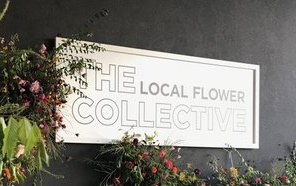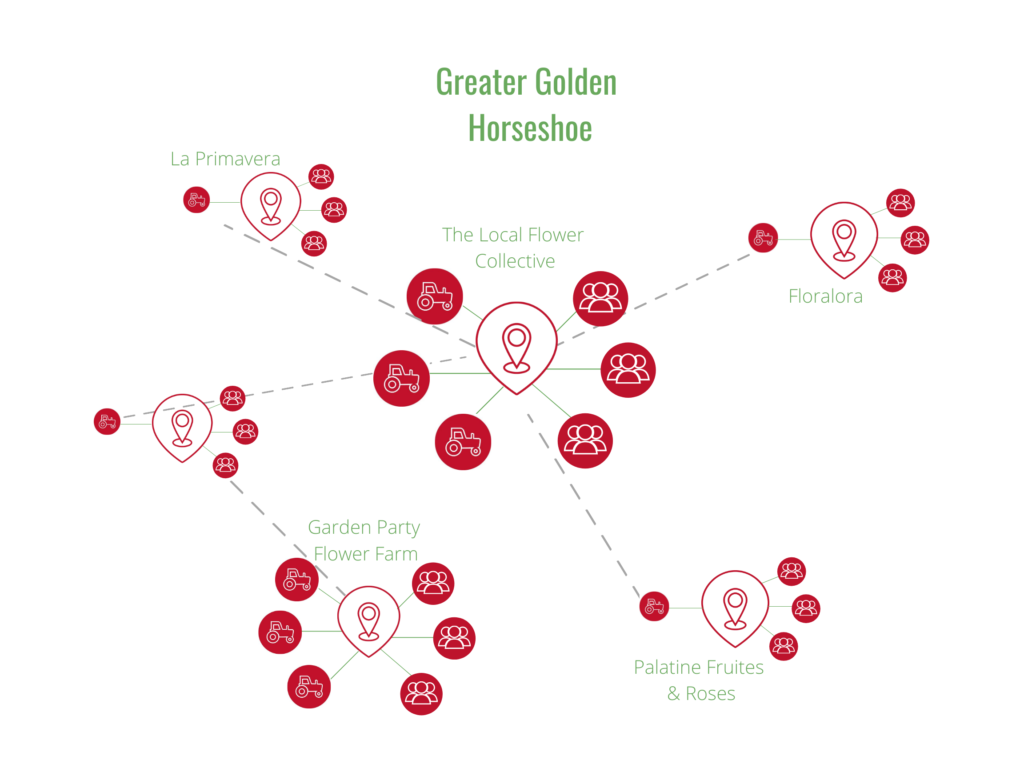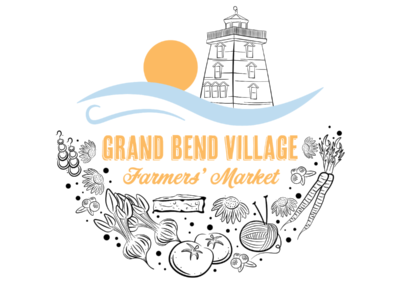Case Study
The Local Flower Collective

Like food hubs, ‘flower hubs’ are a simple but powerful way to connect small-scale, local growers with local buyers. The Local Flower Collective in the Greater Toronto Area offers one example of this model in action. As a membership-based business-to-business network, The Local Flower Collective brings together a dozen sustainable flower growers with over 50 high-end floral designers to coordinate the sale and distribution of local flowers throughout the Golden Horseshoe region.
Using the Open Food Network platform to coordinate ordering, and a central location for drop-offs and pickups, The Local Flower Collective acts as a cooperative one-stop shop for diverse locally grown flowers.
Solutions for the ugly side of cut flowers
 When we think about sustainable farming, we usually think of food. Many people are unaware of the carbon footprint, chemical processing, and unethical growing practices that can be involved in many of the cut flowers that are imported into Canada. But that’s starting to change, as more designers and individual consumers become aware of ‘sustainably grown’ flowers. More and more local growers—particularly young women entrepreneurs—are stepping up to supply a burgeoning field-to-vase market.
When we think about sustainable farming, we usually think of food. Many people are unaware of the carbon footprint, chemical processing, and unethical growing practices that can be involved in many of the cut flowers that are imported into Canada. But that’s starting to change, as more designers and individual consumers become aware of ‘sustainably grown’ flowers. More and more local growers—particularly young women entrepreneurs—are stepping up to supply a burgeoning field-to-vase market.
The main challenge for small growers and new flower farmers is finding ways of reaching markets in a profitable way. In urban areas like the Greater Toronto Area, prices and demand for cut flowers are strong, but e-commerce solutions and delivery costs can cut into profit margins substantially. Individually, small-scale flower growers are also limited in the size of order they can fulfill. Small, independent designers face their own challenges in accessing local products, as they may not meet order minimums for wholesale sellers.
Making local sustainable
The Local Flower Collective was founded by two Toronto event florists—Jaimie Reeves and Carrie Fisher—as a way to bridge these gaps. Once a week, from May to October, growers list their available flowers, and florists place orders through the Open Food Network platform.

Growers then deliver their products to the collective’s studio space in Toronto’s west end, where florists pick up orders at a scheduled time. A small mark-up pays for the studio space and administration, and growers can set their own transportation costs, with price transparency to the buyer.
As a not-for-profit, OFN allows member growers to access e-commerce solutions at a manageable cost. Once they have set up their digitized product list, entrepreneurs belonging to The Local Flower Collective can also sell in their own shops—both retail and wholesale—allowing them to operate year-round and to expand their reach with OFN features like pop-up sales.
“I think we will be doing these ‘pop-up’ stores throughout the season. It’s exciting for us to be able to create a buzz around specialty and seasonal items and our customers love it!”
Theresa Schumlias, member of The Local Flower Collective
Seeds of change
The benefits of flower hubs like The Local Flower Collective are obvious. As part of a network, small-scale growers are able to save on costs and supply larger orders than they can individually; likewise, florists gain easy one-stop access to local farmers and more diverse local flower selections. While the bulk of The Local Flower Collective’s operation is business-to-business, the group has been expanding to connect with consumers directly through online workshops, flower subscriptions, and memberships for hobby florists. The Collective also offers floral design services to create local, sustainable and no-waste weddings and events. Part of their vision is to continue spreading change by educating the public on the ecological, social and ethical value of buying locally grown flowers.



Latest Case Studies
We're Here to Help
Have an idea, a project or a question? Want help using the Open Food Network software? Get in touch and find out how we can help you with it.

Open Food Network is a free and open source software platform. Our content is licensed with CC BY-SA 3.0 and our code with AGPL 3.
We take good care of your data. See our cookies policy



